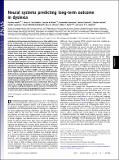Neural Systems Predicting Long-Term Outcome in Dyslexia
Author(s)
Hoeft, Fumiko; McCandliss, Bruce D.; Black, Jessica M.; Gantman, Alexander; Zakerani, Nahal; Hulme, Charles; Lyytinen, Heikki; Whitfield-Gabrieli, Susan; Glover, Gary H.; Reiss, Allan L.; Gabrieli, John D. E.; ... Show more Show less
DownloadGabrieli-Neural systems.pdf (425.3Kb)
PUBLISHER_POLICY
Publisher Policy
Article is made available in accordance with the publisher's policy and may be subject to US copyright law. Please refer to the publisher's site for terms of use.
Terms of use
Metadata
Show full item recordAbstract
Individuals with developmental dyslexia vary in their ability to improve reading skills, but the brain basis for improvement remains largely unknown. We performed a prospective, longitudinal study over 2.5 y in children with dyslexia (n = 25) or without dyslexia (n = 20) to discover whether initial behavioral or brain measures, including functional MRI (fMRI) and diffusion tensor imaging (DTI), can predict future long-term reading gains in dyslexia. No behavioral measure, including widely used and standardized reading and language tests, reliably predicted future reading gains in dyslexia. Greater right prefrontal activation during a reading task that demanded phonological awareness and right superior longitudinal fasciculus (including arcuate fasciculus) white-matter organization significantly predicted future reading gains in dyslexia. Multivariate pattern analysis (MVPA) of these two brain measures, using linear support vector machine (SVM) and cross-validation, predicted significantly above chance (72% accuracy) which particular child would or would not improve reading skills (behavioral measures were at chance). MVPA of whole-brain activation pattern during phonological processing predicted which children with dyslexia would improve reading skills 2.5 y later with >90% accuracy. These findings identify right prefrontal brain mechanisms that may be critical for reading improvement in dyslexia and that may differ from typical reading development. Brain measures that predict future behavioral outcomes (neuroprognosis) may be more accurate, in some cases, than available behavioral measures.
Date issued
2010-12Department
Massachusetts Institute of Technology. Department of Brain and Cognitive SciencesJournal
Proceedings of the National Academy of Sciences
Publisher
Proceedings of the National Academy of Sciences (PNAS)
Citation
Hoeft, F. et al. “Neural Systems Predicting Long-term Outcome in Dyslexia.” Proceedings of the National Academy of Sciences 108.1 (2010): 361–366. Web. 30 Mar. 2012.
Version: Final published version
ISSN
0027-8424
1091-6490